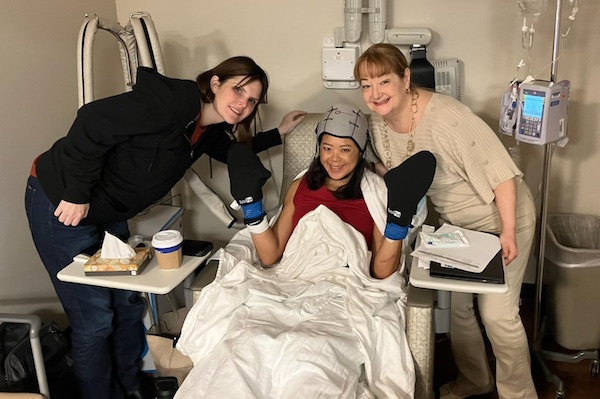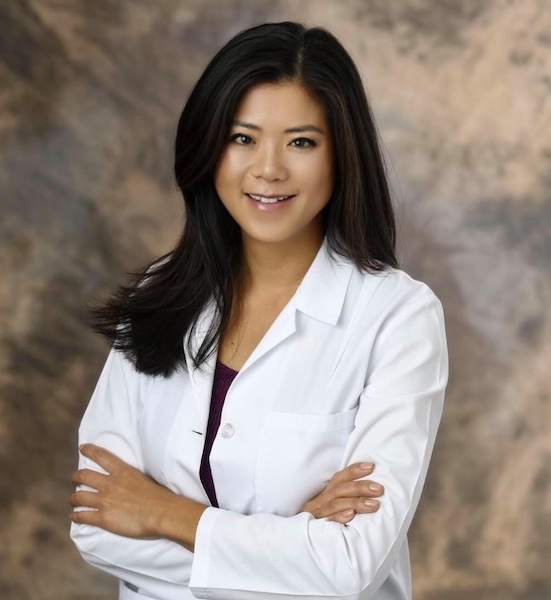Breast Cancer Awareness Month: Physician walks in her patient's shoes
Special to the FMA from AdventHealth
“I don’t have time. I have three kids in three different schools, and I have a busy breast cancer practice – I’ll do it later.”
That’s what 46-year-old Catherine Hwang, MD, a radiation oncologist at the AdventHealth Cancer Institute, told herself in January when it came time to get her yearly mammogram. With no family history or major risk factors for the disease, she thought she could postpone it. Her colleague and best friend, Devina McCray, MD, an AdventHealth breast cancer surgeon, told Dr. Hwang not to delay and threatened to walk her down to radiology if she didn’t do it herself.
“They saw some calcifications in the right breast, so we did an ultrasound, and they found five tumors and a lymph node,” Dr. Hwang said. “The two largest tumors and a lymph node were biopsied, and they came back positive for cancer.”
The nightmare didn’t stop there. An MRI showed scattered disease throughout the right breast.
“I kept getting hit with one piece of bad news after another,” she said. “I just wanted one piece of good news.”
Fighting the battle
In January, the AdventHealth Multi-Disciplinary Breast Clinic Care Team recommended a right mastectomy and endocrine therapy for her treatment. Dr. Hwang’s physicians told her they were not going to be able to save her breast, so she elected to have both breasts removed with reconstruction.

AdventHealth radiation oncologist Catherine Hwang, MD (center), is shown during her last cycle of chemotherapy.
Her treatment plan changed once results from surgery were in and showed more extensive disease, more tumors, than initially anticipated.
“I went from needing just a pill to needing chemotherapy, radiation, CDK4/6 inhibitors and endocrine therapy,” Dr. Hwang said.
Diagnosed with lymph node positive breast cancer (Stage IIB), she completed four cycles of chemotherapy in May. During her treatments, she lost her most of hair.
“Actually, losing my hair was harder than losing my breasts because it was my look, my identity,” she said. Dr. Hwang also noted that Sabrina Pavri, MD, medical director of breast reconstruction at AdventHealth, did such a great job with reconstruction that she doesn’t really feel like she had mastectomies.
Radiation started on June 11, just four weeks later.
“I would see patients and then pop over to the radiation machine, get my treatment, and then go back to work and see a patient,” said Dr. Hwang.
She finished radiation therapy on July 1, 2024, and is now on the path to recovery.
A new awareness
“I’m going to say ‘no’ more to things that don’t bring me joy,” Dr. Hwang answered immediately when asked what she’s realized during this journey. She also has learned to appreciate every day, focus on friends and family, and not to sweat the small stuff.
“I played tennis in college and fell out of it because of medical school, kids and life,” she said. “Now that cancer has happened, I realize I miss it and want to get back to playing.”
Dr. Hwang said she now has a much better understanding of what her patients go through during treatment and has a renewed focus on educating and advocating for her patients.
She actively discusses lifestyle modification with her patients and encourages them to eat cleaner (think whole foods), and to be mindful of what they eat and how much. She urges her patients to manage their weight because obesity is part of the reason that post-menopausal breast cancer is on the rise.
“The more fat you have, the more estrogen you have in your body because fat is converted into estrogen,” said Dr. Hwang. “If you can drop fat, you will also decrease the amount of estrogen. In post-menopausal women, lower estrogen levels mean lower risk of developing breast cancer or developing recurrent breast cancer. Losing weight improves outcomes. Knowing this motivates people and helps them stay focused during their weight loss journey.”
She also talks to her post-menopausal cancer patients about three things they need more of, which are “more exercise, more resistance training, and more protein in their diet.”
Connecting on a different level
Through transparency and honesty, Dr. Hwang has found a new connection with her patients by sharing her cancer diagnosis and her experiences.
“I tell them, ‘You’re going to be tired; you’re going to get sick; you’re going to have a lot of emotions and feel like you’re on a rollercoaster. You will also get a lot of different opinions on how to get through this from people who want to help, but do what feels right,’ ” she said. “I’ve been there, and I think they trust me more now that I’ve been in their shoes.”
Dr. Hwang encourages all women to practice self-care, and that includes getting screened regularly.
“We take care of everyone else, but I don’t think most women prioritize themselves. Regular screenings must be part of that prioritizing process. Finding breast cancer when it is small means less treatment.”
Dr. Hwang is one of more than 2,600 patients who have been helped by the AdventHealth Breast Multidisciplinary Clinic model since 2018.
“My Breast MDC team, who are also my colleagues and friends, set everything up for me; the mammogram, biopsy, MRI and surgery – it was all organized for me,” she said. “It was great because from the diagnosis on, it was all a blur.”
At the AdventHealth Breast MDC, this is the type of service provided to all patients. The model is designed to be a one-stop shop for treatment where physicians sit down with patients and and map out organized treatment plans from the day of the first meeting through completion of treatment.
Over the past six years, the successful model has expanded from Altamonte Springs to Orlando, Celebration and Winter Park campuses, with the Kissimmee campus coming soon.
